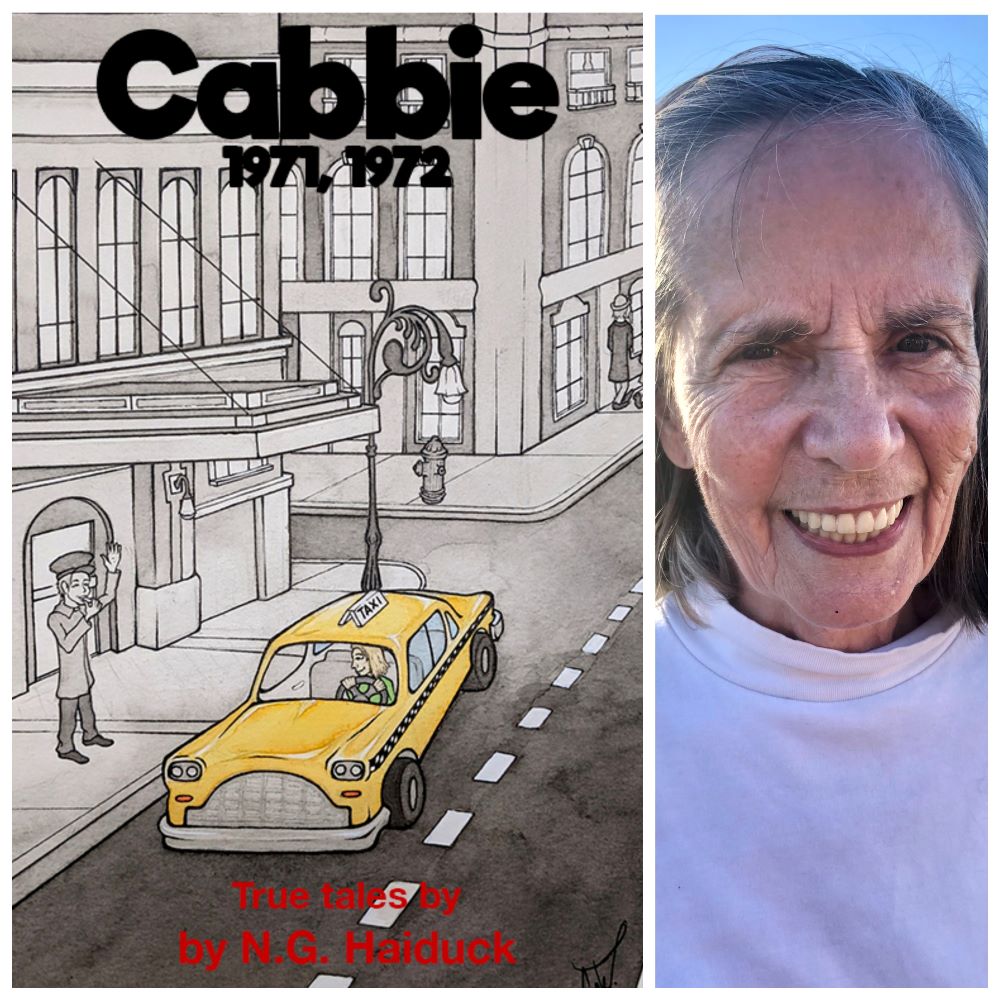Description
Cabbie: New York City 1971,1972 True Tales
by N.G. Haiduck
Full-length, paper, short stories
List: $24.99
979-8-88838-436-7
2024
N.G. Haiduck is the recipient of the Jerome Lowell DeJur Award in Creative Writing from The City College of New York, the BRIO (Bronx Recognizes Its Own) Award from the Bronx Council on the Arts, and the Janice Farrell Poetry Prize from the National League of American Pen Women. She was a finalist for the Ed and Fay Phillips Prize in Poetry, Hannah Kahn Poetry Foundation. Publications include Flying South, Hanging Loose, Interpoezia Intercultural Magazine, Main Street Rag, The Naugatuck Literary Review, New Verse News, Paterson Literary Review, and The Prairie Home Companion. She is married to clarinetist Neal Haiduck. They live in Burlington, Vermont.






Nancy Haiduck (verified owner) –
I read through this slender volume in one delicious sitting. Turning page after page, I think I never stopped smiling.
I, too, worked as a NYC cabbie in the early 70s, and let me tell you, Ms. Haiduck nails the the heady vibe in the air during that transitional period in the life of the great metropolis: the unique excitement of a bubbling artistic creativity (think “Rent,” Andy Warhol’s Factory, CBGB) in the face of a depressing urban decay.
(The City was then burdened by years of accumulated debt brought on by the relentless shuttering of its once vital factory-driven tax base which nearly culminated in a 1975 declaration of bankruptcy, before over the next few years, the emerging finance industry took off like gangbuster. With the safer and improving urban landscape, the tourist visits to the Big Apple roared back in spades, further solidifying the City’s finances.)
What the reader gets is a unique and charming window into the N.Y.C of the early 70’s as filtered through the eyes of one of the extremely rare female cabbies of the time. Sure, for obvious reasons, I especially enjoyed the taxi focus, but it is the sparkling evocation into the evolving mindset of a young woman of the era that truly made for a riveting read.
My only complaint was that the book wasn’t longer : )
Fred Solomon, AKA Jernigan Pontiac, author of “Hackie”
Nancy Haiduck (verified owner) –
“Every time I’m parked at a red light, I look to my right, someone is smiling at me in the next car. I look to my left, the other driver is staring at me in disbelief…One guy said, ‘For God’s sake, don’t drive like a girl!’ My tips are fantastic.”
What a treat to read this gem of a collection of non-fiction short stories. Nancy was a cab driver in the early 70s in New York City. Petite and young, she had to be strong and resilient to deal not only with the guys at her taxi garage, but with customers and other drivers. These stories are an honest slice of her life, unfiltered, revealing her youth, her vulnerability and determination to succeed in the city. I did not want the stories to end – so please, Nancy – write some more stories.
On a side note – I loved going to the Horn & Hardart when I was a kid in Manhattan; we went to the one either on East 86th St. or on 33rd St. close to B.Altman where my mother used to work!
Noel Ferrer (as posted on Amazon)
Ryan McCarty –
I’ve been reading N.G. Haiduck’s new book Cabbie: 1971, 1972, a series of vignette prose poems telling the story of her time as one of the first women driving yellow taxis in NYC. It’s absolutely fabulous. I gave the copy I finished to my mom today and I bet it’ll be finished by the time she goes to bed tomorrow.
I was thinking about was a fabulous noticer she was early on while reading “La Fille Mal Gardée,” after this long bit about shirking work a little to go and see something fabulous (an opera she and a friend got free tickets to). Nancy ends up on one of those everyday jarring lousy work nights and afterwards she ends throwing her gaze down to her shoes, which “no longer look new, but well worn.” And that’s it. This great little image that reminds us that she’s no rookie, and she’s wearing her experience well. Then we end up looking down at our own feet, or down at the feet nearby us, and something happens.
The stories she’s telling throughout are adorable and insightful and lonely and hopeful and exactly what I remember being a working class kid in your 20s was like. But the real captivating thing is all these little bits of noticing, the cold morning joys of oatmeal or the sad comfort of the tiny trickle of heat from the radiator after a night shift. Whenever I hear people talk like poetry isn’t for them, I think about poems like these and wonder if those folks just haven’t read the right poetry or if they just don’t stop to think thoughts like how there’s “something about a newspaper flying on the street that is so Autumn in the City-ish.” I feel bad for them, whatever it is.
Then Nancy blows these minutia right through the roof in “Stops Along the Way,” where she’s just listing through all these little joys – shoving coins into automated food dispensers in cabbie diners, the oddities you can find in little corner stores, the kids busting out after school and yelling to each other in Spanish, the smell of barrels of tobacco in smoke shops, people practicing scales upstairs in her building, and all the things that poems (I accidentally typed “poets” just now and almost left it) are built out of, and she wraps up with a classic bit of New York poetry love:
“My passengers say the reason I am so enthralled with New York is because it’s still a novelty for me. They say, ‘Wait till you’ve been here ten years.’ But every once in a while I get a passenger who says, ‘Oh, New York is beautiful in the winter!'”
Nancy ends the last bit of Cabbie in “Just Wait.”
“I thought about praying or meditating since I have nothing to do. This impulse usually comes on after I read the news. I feel an impulse to pray for peace for Ireland, for example, but then realize that God (if there is one) is not going to do anything about it. That’s the secret of praying (or meditating, whatever you call it): don’t ask for anything because that is hopeless. Just give thanks. If you want peace, you could meditate on the peacefulness of the church or the place where you are at the moment. Then, by concentrating on just that tiny space of peace in the church, the space grows, in your mind anyway.”
That’s what I mean by the difference poetry makes.
THANK YOU RYAN MCCARTY!!